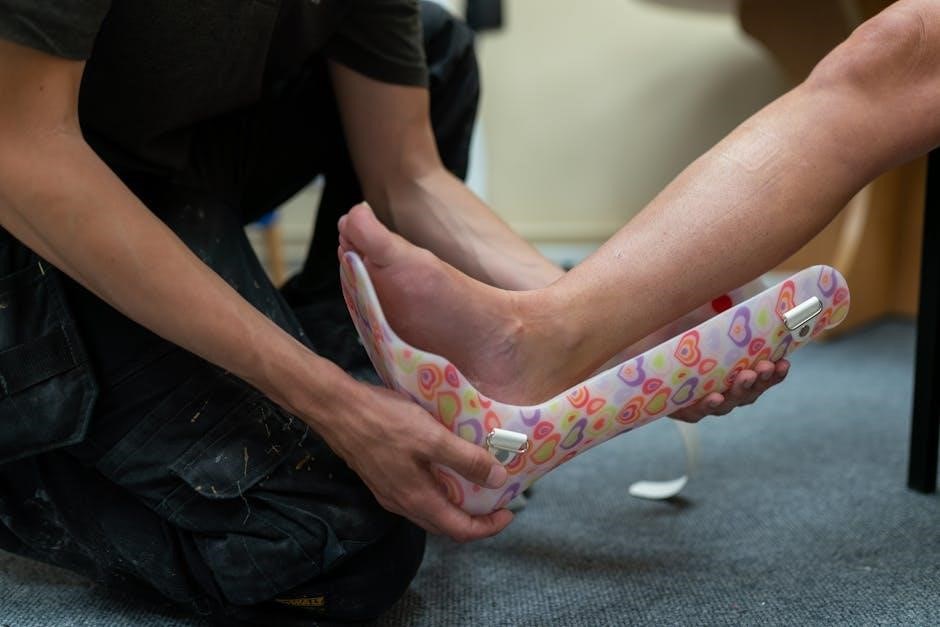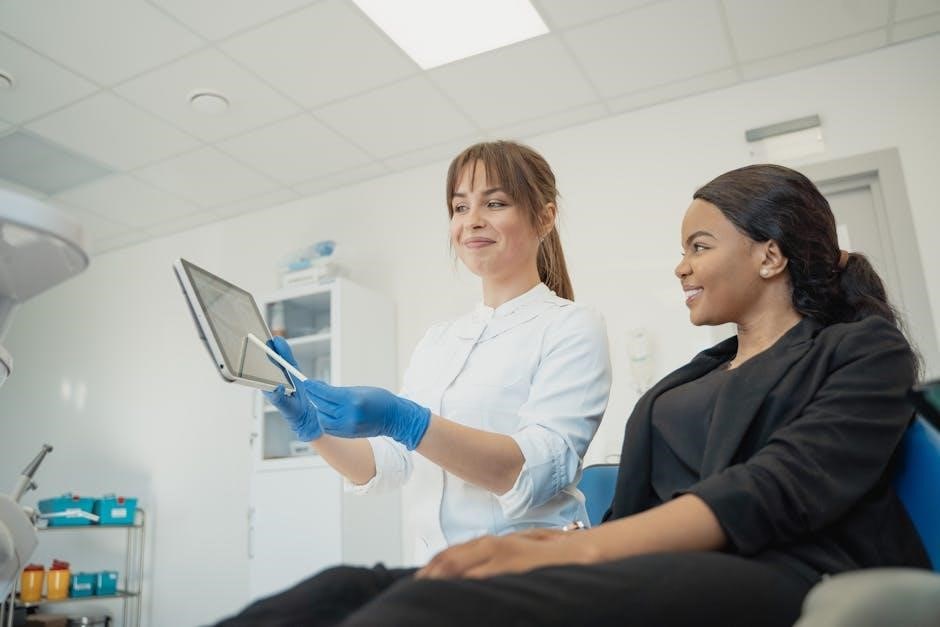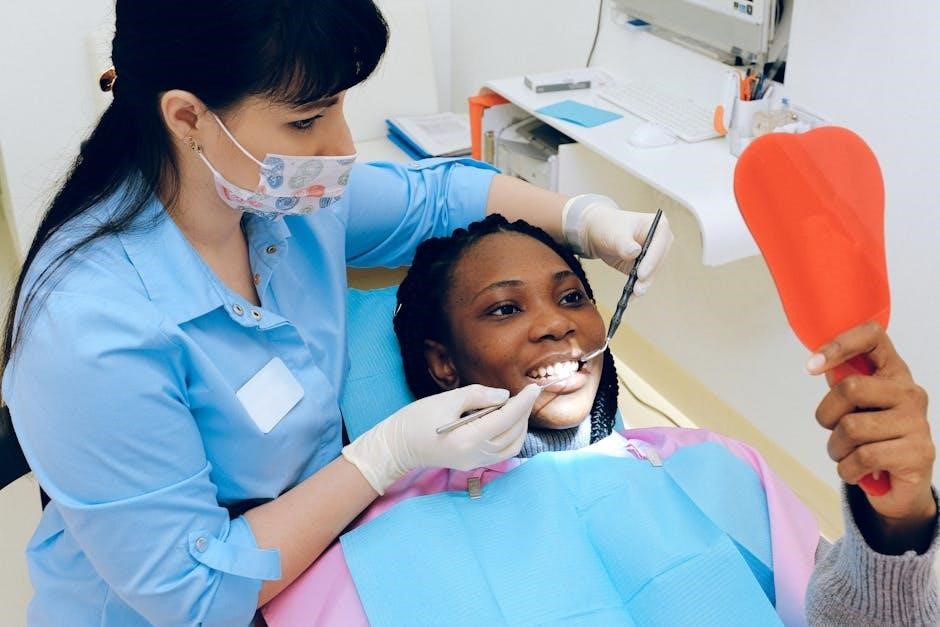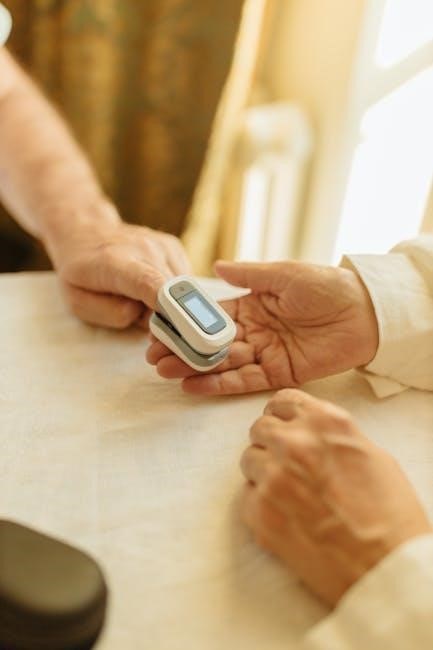A Patient Care Technician (PCT) plays a vital role in healthcare‚ providing direct patient care under the supervision of nurses and physicians. They assist with daily activities‚ monitor vital signs‚ and support medical procedures‚ ensuring patient comfort and safety. This role requires strong interpersonal skills‚ attention to detail‚ and a commitment to delivering compassionate care. PCTs are essential team members in hospitals‚ clinics‚ and long-term care facilities‚ contributing to holistic patient well-being.
Overview of Patient Care Technician Responsibilities
Patient Care Technicians (PCTs) are responsible for providing hands-on care to patients‚ assisting with daily activities such as bathing‚ dressing‚ and feeding. They measure vital signs‚ monitor patient conditions‚ and report changes to healthcare providers. PCTs also prepare patients for medical procedures‚ assist with mobility‚ and maintain a clean and safe environment. Additionally‚ they document patient information‚ use medical equipment‚ and ensure confidentiality under HIPAA guidelines. Their role is crucial in supporting the healthcare team while delivering compassionate and individualized care to patients in various healthcare settings.
Importance of Patient Care in Healthcare Settings
Patient care is the cornerstone of healthcare‚ ensuring patients receive compassionate‚ safe‚ and effective support. It directly impacts patient outcomes‚ satisfaction‚ and quality of life. Effective patient care fosters trust between patients and healthcare providers‚ promoting better communication and adherence to treatment plans. It also enhances patient safety by addressing individual needs and preventing complications. Additionally‚ patient care supports the healthcare team by enabling efficient workflow and reducing readmissions. By prioritizing patient-centered care‚ healthcare settings can improve overall well-being‚ ensure dignity‚ and create a positive environment for recovery and healing. This approach is vital for delivering holistic‚ high-quality care.

Key Skills and Knowledge for Patient Care Technicians
Patient Care Technicians require a blend of clinical expertise‚ strong communication‚ emotional intelligence‚ and adaptability to provide high-quality‚ patient-centered care effectively.
Essential Clinical Skills for Patient Care
Patient Care Technicians must master vital clinical skills to deliver effective care. These include accurately measuring vital signs‚ such as blood pressure and heart rate‚ and monitoring patient conditions for any changes. They must also assist with Activities of Daily Living (ADLs)‚ like bathing‚ dressing‚ and feeding patients‚ ensuring their comfort and hygiene. Proficiency in using medical equipment‚ such as glucometers and EKG machines‚ is crucial for performing diagnostic tests. Additionally‚ understanding proper infection control measures and maintaining a sterile environment is vital to prevent patient infections. These skills ensure safe‚ efficient‚ and compassionate care‚ making PCTs indispensable in healthcare settings.
Communication Strategies with Patients and Families
Effective communication is crucial for Patient Care Technicians to build trust and ensure patient-centered care. Active listening‚ empathy‚ and clear verbal communication help patients feel understood and valued. Using simple‚ non-technical language ensures clarity‚ especially for those with limited medical knowledge. Non-verbal cues‚ such as maintaining eye contact and a calm demeanor‚ also enhance communication. Encouraging patients and families to ask questions fosters collaboration and addresses concerns. Additionally‚ involving families in care decisions respects patient autonomy and promotes a supportive environment. Effective communication strategies empower PCTs to provide compassionate‚ personalized care‚ improving patient outcomes and satisfaction in healthcare settings.
Understanding Medical Terminology and Documentation
Understanding medical terminology is essential for Patient Care Technicians to accurately interpret and document patient information. Familiarity with terms like “vital signs” and “ADLs” ensures clear communication among healthcare teams. Proper documentation involves recording patient conditions‚ treatments‚ and responses to care‚ adhering to HIPAA guidelines for confidentiality. Accurate and timely documentation is critical for legal reasons and continuity of care. PCTs must maintain organized records‚ using standardized formats to ensure consistency. Proficiency in medical terminology and documentation practices supports effective patient care and legal compliance‚ making it a cornerstone of a PCT’s responsibilities in healthcare settings.

Clinical Procedures and Techniques
Patient Care Technicians perform essential clinical tasks‚ such as measuring vital signs‚ assisting with ADLs‚ and operating medical equipment. These procedures require precision and adherence to protocols to ensure patient safety and effective care delivery.
Measuring Vital Signs and Monitoring Patient Conditions
Measuring vital signs is a cornerstone of patient care‚ providing essential data on a patient’s health status. This includes assessing temperature‚ pulse‚ respiratory rate‚ blood pressure‚ and oxygen saturation. Accurate measurement requires skill and attention to detail‚ as these readings guide clinical decisions. Technicians use stethoscopes‚ blood pressure cuffs‚ and pulse oximeters to obtain precise results. Monitoring patient conditions involves observing changes in behavior‚ skin appearance‚ and physical responses‚ which can indicate improving or deteriorating health. Regular documentation of these observations ensures continuity of care and helps healthcare teams respond promptly to potential issues. Proficiency in these tasks is vital for ensuring patient safety and effective care delivery.

Assisting with Activities of Daily Living (ADLs)
Patient Care Technicians play a crucial role in helping patients with Activities of Daily Living (ADLs)‚ such as bathing‚ dressing‚ grooming‚ and eating. These tasks are essential for maintaining patient dignity‚ hygiene‚ and overall well-being. Technicians must use proper lifting and transferring techniques to ensure patient safety and prevent injuries. They also assist with mobility‚ such as walking or using wheelchairs‚ to help patients maintain independence. Additionally‚ PCTs provide emotional support and encouragement‚ fostering a sense of autonomy and confidence in patients. Effective communication and empathy are key in making patients feel comfortable during these intimate care activities. This support is vital for patients recovering from illness or surgery‚ or those with limited mobility or cognitive impairments.
Using Medical Equipment and Technology Effectively
Patient Care Technicians must be proficient in using medical equipment and technology to ensure accurate patient monitoring and safe care. Common devices include blood pressure monitors‚ thermometers‚ EKG machines‚ and glucometers. Proper training is essential to operate these tools correctly and interpret results. Regular maintenance‚ such as cleaning and calibrating equipment‚ prevents errors and extends device lifespan. Technicians should follow safety protocols to avoid accidents and infections. Staying updated on new technologies through continuous education is crucial. Effective use of electronic health records (EHRs) for documentation and communication with the healthcare team enhances patient care. Troubleshooting skills help address device malfunctions promptly‚ ensuring seamless patient monitoring and support.

Interpersonal and Emotional Intelligence
Interpersonal skills and emotional intelligence are crucial for Patient Care Technicians to build rapport‚ communicate effectively‚ and manage stress. Empathy and genuine care for patients are foundational.
Building Rapport with Patients and Families
Building rapport with patients and families is essential for effective care. Trust and empathy are foundational‚ fostering open communication and understanding. Active listening and clear expression of care are vital.
Managing Stress and Emotional Demands of the Job
Managing stress and emotional demands is crucial for Patient Care Technicians due to the high-pressure nature of the job. Techniques like deep breathing‚ time management‚ and seeking support from colleagues can help mitigate stress. Emotional resilience is key to maintaining professionalism and providing compassionate care. Balancing workload and personal well-being ensures long-term sustainability in this demanding yet rewarding role.

Legal and Ethical Considerations
Understanding HIPAA regulations and maintaining patient confidentiality are critical. Ethical dilemmas often arise‚ requiring adherence to professional standards and mindful decision-making to ensure patient rights and dignity are upheld.
Understanding HIPAA and Patient Confidentiality
The Health Insurance Portability and Accountability Act (HIPAA) mandates the protection of patients’ medical information. Patient care technicians must ensure confidentiality by limiting access to records‚ using secure communication channels‚ and avoiding unauthorized disclosures. This includes not sharing patient data on personal devices or social media. Breaches can lead to legal consequences‚ emphasizing the importance of strict adherence. Training on HIPAA compliance is essential for all healthcare workers to understand their roles in safeguarding sensitive information and upholding patient trust.
Ethical Dilemmas in Patient Care

Ethical dilemmas in patient care arise when conflicting values or principles guide decision-making‚ such as end-of-life care or resource allocation. Patient care technicians may face challenges like respecting patient autonomy versus ensuring safety or navigating cultural differences. These situations require empathy‚ critical thinking‚ and adherence to ethical guidelines. Open communication with the healthcare team and patients is crucial to resolve dilemmas respectfully. Addressing these issues ensures compassionate‚ patient-centered care while maintaining professional integrity and upholding ethical standards in healthcare settings.

Preparing for Certification and Continuous Learning
Certification and ongoing education are crucial for patient care technicians to enhance skills and stay updated on best practices. Dedicate time to study and utilize online resources for professional growth.
Study Tips and Resources for Certification Exams
Earning certification as a Patient Care Technician requires focused preparation. Utilize study guides and online resources to master essential skills and knowledge. Practice with sample questions to build confidence and identify areas for improvement. Enroll in review courses or workshops to deepen understanding of clinical procedures and patient care techniques. Additionally‚ leverage digital tools like flashcards and video tutorials to reinforce learning; Regularly review medical terminology and documentation practices to ensure accuracy. Join study groups or forums to collaborate with peers and gain insights. Consistent practice and thorough review of exam content are key to achieving success on the certification exam.
Importance of Continuing Education in Healthcare

Continuing education is crucial for healthcare professionals‚ including Patient Care Technicians‚ to stay updated on the latest advancements and best practices. The healthcare field evolves rapidly‚ with new technologies‚ treatments‚ and research emerging continuously. By engaging in ongoing learning‚ PCTs can enhance their skills‚ improve patient outcomes‚ and adapt to industry changes. Continuing education also supports career growth‚ allowing technicians to expand their expertise and take on more complex roles. Additionally‚ many certifications require ongoing education to maintain credentials‚ ensuring professionals remain competent and informed. Investing in continuous learning fosters professionalism‚ improves job performance‚ and contributes to the delivery of high-quality patient care.
